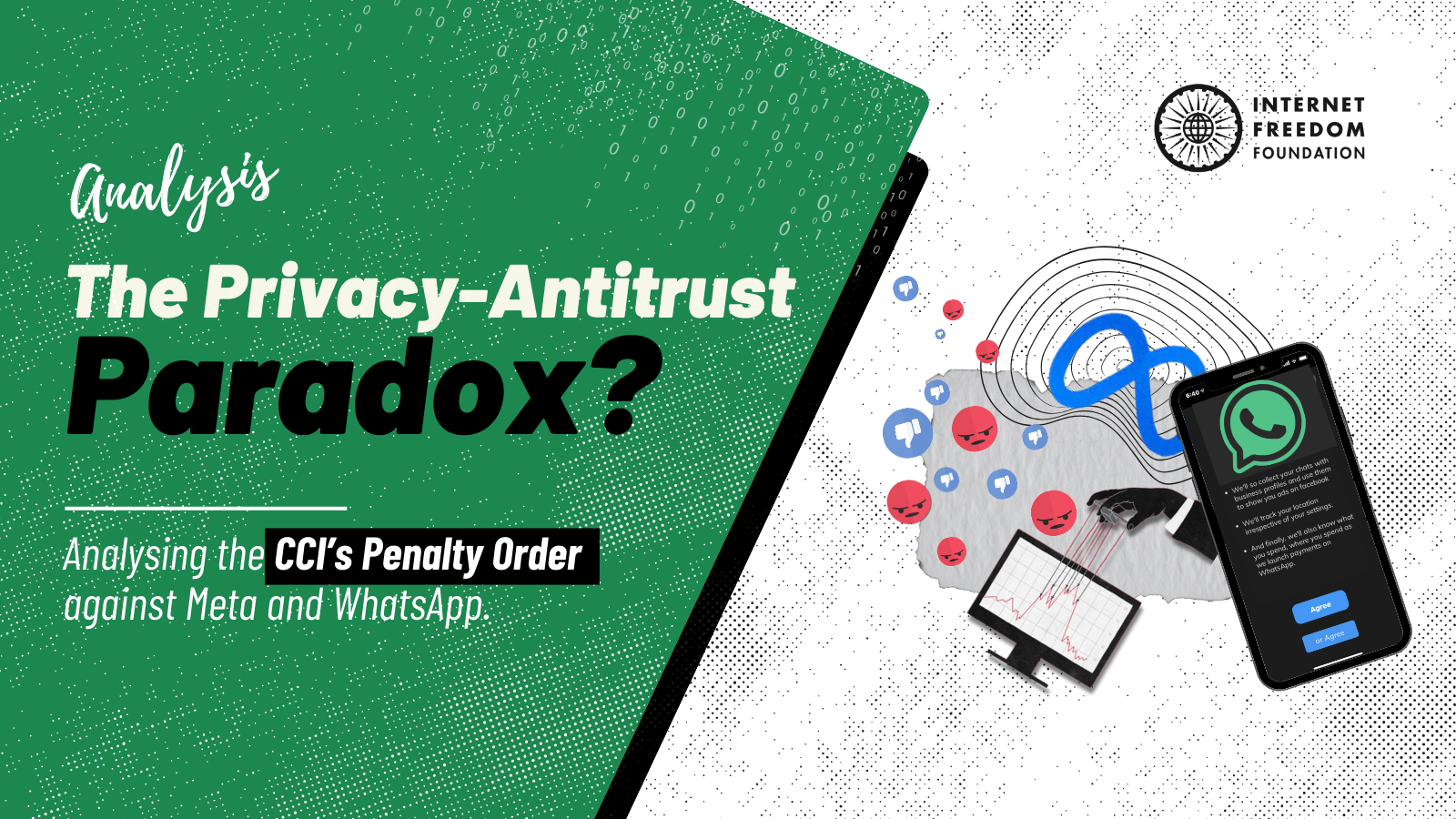
tl;dr
On 18 November 2024, the Competition Commission of India, in a landmark decision, imposed a penalty of Rs. 213.14 crore on Meta and WhatsApp for anti-competitive practices related to their 2021 Privacy Policy Update. This verdict marks a shift in how competition regulators view the intersection of privacy and competition law, particularly in the digital economy.
Background
In January 2021, the Competition Commission of India (“CCI”) took suo motu cognisance of WhatsApp’s 2021 privacy policy (“2021 Policy”), which mandated users to accept updated terms and conditions, including the sharing of personalised user information with Facebook (now Meta). This marked a shift from WhatsApp’s previous privacy policies of 2016 and 2019, which had given users the choice to opt out of personal data sharing.
On 12 October 2021, IFF submitted expert information under Section 19(1)(a) of the Competition Act, 2002 (“Act”), before the CCI, alleging a contravention of Section 4 by Meta. This was subsequently clubbed as Case No. 30 of 2021 with the main investigation. The case centered on how Meta combined user data across its apps and how this practice affected both user privacy and competition. The CCI’s investigation revealed that the 2021 policy update forced users to accept more intrusive data collection practices, leveraging the company’s significant market position.
Analysis of the CCI Order dated 18 November 2024
1. Dominance of Meta in the Relevant Market
The CCI’s approach to market definition acknowledged the complex ecosystem of Meta’s operations by identifying two distinct but interrelated markets: the market for OTT messaging apps through smartphones in India and the market for online display advertising in India. In the OTT messaging market, the CCI rejected Meta’s argument for a broader definition that included traditional SMS, email services, and proprietary apps. It emphasised that different digital platforms provide distinct services and that temporary shifts in usage (such as during outages) do not mean the services are interchangeable. The CCI also noted that SMS operates differently since it does not require both users to be on the same app.
For the online advertising market, the CCI drew distinctions between online and offline advertising, as well as between search and display advertising. The analysis recognised that while these markets may be complementary, they serve different purposes and operate through distinct mechanisms, particularly in terms of user engagement and cost-efficiency. This dual market definition set the foundation for a comprehensive examination of Meta’s market power.
The CCI’s assessment of Meta’s dominance moved beyond traditional metrics to consider data-related advantages. Network effects and switching costs were identified as crucial factors, with higher user numbers leading to platform concentration and creating substantial barriers to entry. It emphasised how Meta’s ecosystem, spanning WhatsApp, Facebook, Instagram, and Facebook Messenger, provides access to vast resources and enables more effective advertisement targeting. Averments related to the “zero-price market” were rejected on the grounds that users provide non-monetary consideration through personal data. The CCI noted WhatsApp's ubiquitous presence in daily life, including its use by individuals, businesses, and government bodies, as a key indicator of its dominance in the market over its competitors.
2. Arbitrariness of the WhatsApp 2021 Policy
The 2021 policy update followed a "take it or leave it" approach, forcing users to accept the terms without a meaningful option to opt-out. The CCI observed that the policy used vague and broad language, allowing WhatsApp to expand data collection at any time. The IFF compared WhatsApp’s policy in India with its EU version, arguing before the CCI that the EU policy was more transparent and detailed, showing that Indian users were treated differently.
The 2021 policy enabled extensive data sharing across Meta companies for purposes beyond core messaging services, including marketing and cross-platform integration. This broad scope of data sharing raised particular concerns given Meta’s dominant market position. The CCI found that this integration of user data across platforms created a feedback loop: more data led to better-targeted advertising, which increased revenue and further strengthened Meta’s market position.
3. Role of Data Sharing in Competitive Practices
The CCI’s analysis of how data practices affect market competition revealed the fundamental role of data in shaping market dynamics. The CCI recognised that data is the cornerstone of effective online display advertising, enabling advertisers to precisely target specific audience segments and ensure optimal return on investment. Through the 2021 Policy update, Meta gained a significant competitive advantage by removing the opt-out option and expanding the scope of data collection, which enhanced its ability to benefit from a wider reach and deeper understanding of user behaviour.
The integration of WhatsApp’s data into Meta’s advertising allows it to offer superior advertising solutions, which attract more advertisers and drive more revenue. This was evidenced by the dramatic increase in Meta’s advertiser numbers, which nearly doubled after implementing the 2016 privacy policy that enabled data sharing with Meta. The CCI noted that entering the online display advertising market requires substantial investment in technology and user acquisition. Given Meta’s existing dominance and access to vast user data, it becomes exceedingly difficult for new players to replicate a similar level of engagement and data-driven insights. Meta’s unique ability to precisely target audiences and optimise advertising campaigns, supported by data from multiple platforms, makes it the preferred advertising partner for sellers. This advantage is further strengthened by the increasing adoption of WhatsApp Business by small and midsize businesses, allowing Meta to build even more detailed audience profiles and enhance its ability to deliver highly targeted ads. The vast data pool has become a key factor behind Meta’s unassailable position in the online display advertising market and acts as a significant barrier to entry for new competitors who are unable to match the scale of data Meta possesses.
The Blurry Lines between Privacy and Antitrust
The traditional approach to privacy and competition law has treated them as distinct regulatory domains, each serving different objectives. Privacy laws aim to protect individual data rights and ensure informed consent, while competition laws focus on maintaining market efficiency and preventing the abuse of market power. However, the unique characteristics of the digital economy have challenged this separation, leading to what scholars now call the “privacy-antitrust paradox.”
The European Union initially maintained a strict separation between these domains, as reflected in cases like Asnef-Equifax and Google/DoubleClick, where the European Commission and courts refrained from integrating privacy concerns into antitrust analyses. Instead, they argued that privacy breaches fall within the purview of data protection regulations, such as the General Data Protection Regulation (“GDPR”). In the Facebook/WhatsApp merger, the Commission reiterated that privacy-related issues, even when linked to data concentration, should be addressed by data protection authorities, thus reinforcing the rigid compartmentalisation of these legal regimes.
However, a more integrationist approach has gained traction recently in countries like Germany. In a landmark decision, Germany’s Federal Cartel Office (FCO) identified Facebook’s collection and processing of personal data as unfair and indicative of anti-competitive conduct, linking privacy violations to market power abuse. The decision was upheld by the Court of Justice of the European Union (CJEU), which emphasised that the application of competition law to address data protection breaches in the context of abuse of dominance does not restrict the authority of data protection authorities. Germany has also notably made amendments to its Act against Restraints of Competition, 1958, explicitly recognising zero-price markets and multi-sided markets, enabling a nuanced analysis of data-driven market power.
Japan’s stance, while aligned with the integrationist view, adopts a more collaborative regulatory framework. The Japan Fair Trade Commission (JFTC), through its Guidelines Concerning Abuse of a Superior Bargaining Position, categorises certain data practices as anti-competitive. For instance, the unauthorised collection and use of personal information by digital platforms are viewed as abuses of superior bargaining positions, violating the Anti-Monopoly Act, 1947.
The United States (U.S.) has historically leaned towards the separatist approach, particularly under the influence of the Chicago School, which prioritises consumer welfare through price and output metrics. However, recent enforcement actions by the Federal Trade Commission (FTC) suggest a shift towards integrating privacy concerns into antitrust scrutiny. In cases involving major tech companies, the FTC has begun to examine how data collection practices contribute to market power and consumer harm. The U.S., thus, remains cautious in aligning privacy explicitly with antitrust enforcement, often relying on consumer protection laws to address privacy breaches.
CCI’s pro-privacy stance!
The CCI’s penalty on Meta is a defining moment in India’s competition law framework, underscoring the growing recognition of privacy as a key element of fair competition. Unlike in earlier cases such as Matrimony.com and Vinod Kumar Gupta, where privacy issues were acknowledged but relegated to the Information Technology Act, this order marks a significant development in building India’s position on privacy-antitrust integration. By identifying the 2021 policy as a direct abuse of dominance under Section 4 of the Competition Act, the order sets a pro-privacy precedent in Indian competition law jurisprudence. This recognition is particularly significant in zero-price markets, where privacy is as much a competitive parameter as it is a consumer right.
Appeal before NCLAT
This order has been appealed before the NCLAT by WhatsApp LLC and Meta Platforms Inc., seeking a stay on the CCI order as interim relief. On 16 January 2025, the arguments for admission of the appeal were heard before the NCLAT chair on the grounds that the CCI exceeded its jurisdiction by ruling on the aspect of data protection. The CCI strongly opposed the appeal and a stay on the order. The appeal has been admitted, with the order on interim relief to be passed on the next date of hearing, i.e., 23 January 2025. We thank the legal team at Sarvada Legal, led by Mr. Abir Roy, for representing IFF.
This post was drafted by IFF Legal Intern Ahsnat Mokarim and Associate Litigation Counsel Naman Kumar.

